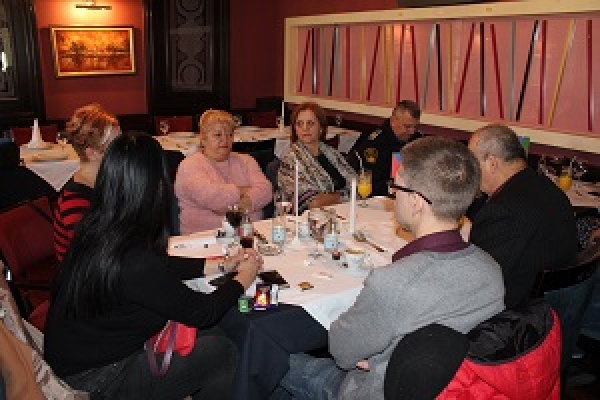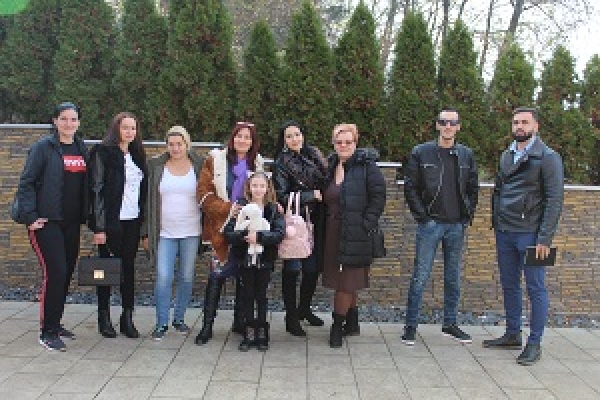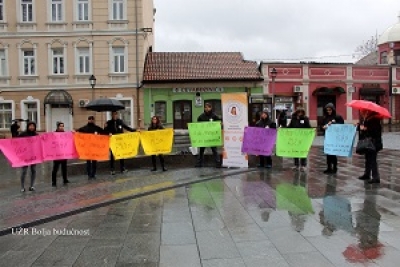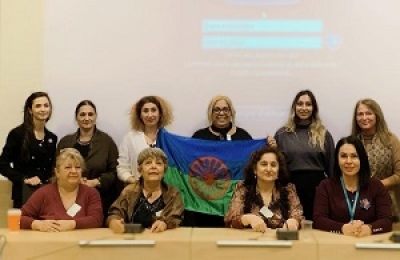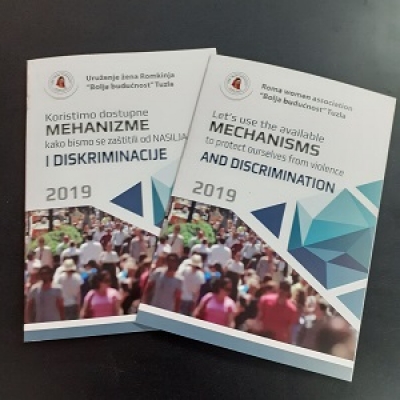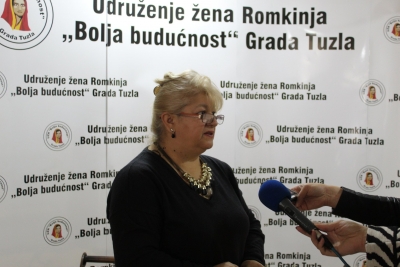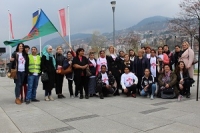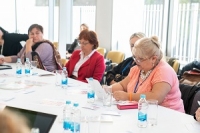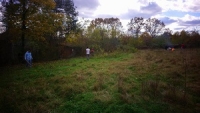
News (134)
Novosti na engleskom jeziku.
The implementation of Community score card process with service providers
Written by NovostiWe continue with our activities of implementing the priority ranking method (Community score card) and today (20.12.2019) we held a meeting with representatives of institutions and organizations at the local level. This meeting is organized after the community process and is based on the same method as with the community. At this meeting, we identified barriers to the service delivery process but from a different angle than with the community. This is an important step to improve the quality of service and communication between recipients of services and service providers.
Meetings for the implementation of the Community score card method are implemented as part of the regional project "For the active inclusion and rights of Roma women in the Western Balkans III", supported by Austrian Development Cooperation and Czech Development Cooperation through CARE INTERNATIONAL, Balkans.
Today (18. december 2019) we have a meeting with community members in Tuzla and on this meeting we use the Community Score Card tool. We do parallel processes in Tuzla , Lukavac, Prnjavor and Vukosavlje. After the meeting with communities we will conduct the same process with service providers and we will make a joint plan of action for improving the access and cooperation with between service providers.
The CSC process is implementing as part of regional project "For active inclusion and rights of Roma women in western Balkan III" supported by Austrian Development Agency and Czech Development Cooperation through CARE INTERNATIONAL Balkans..
The Community Score Card (CSC) process is a powerful tool to monitor services, empower citizens, and improve the accountability of service providers. The scoring exercises provide citizens the opportunity to analyse services such as health services or education based on their personal perceptions. Citizens can provide encouragement for good work or express dissatisfaction. In a common collaboration between rights holders and duty bearers, the provision of services can sustainably change for the better.
The purpose of a Community Score Card process is to improve the quality, efficiency and accountability of services at community level. It is a two-way and ongoing participatory process which seeks to strengthen the mutual understanding between service providers and service users to ensure collaborative actions and overcome gaps. It helps you to:
-Identify how services are experienced by the users and the providers.
- Establish a feedback mechanism between users and providers.
- Ensure informed decision making and dialogue between service providers and users.
- Track if services and programmes are progressing well and compare the performance of services across facilities.
- Report on the quality of services to a district executive committee or assembly.
- Strengthen community empowerment and citizen voice.
It is NOT about finger-pointing or blaming. It is NOT designed to settle personal scores.
It is NOT supposed to create conflict.
Street action in Tuzla on International Human Rights Day
Written by NovostiThe cold weather and rainfall did not prevent members of the Roma Women 's Association "Bolja buducnost“from Tuzla to hold street action and send a message on December 10th the International Human Rights Day that they are among the most vulnerable categories of our society.
By symbolically organizing this event on Human Rights Day, we wanted to draw public attention to the position of Roma women in B&H. Roma women, like all other women in BH society, find themselves in a more difficult position than men in terms of employment, education, political participation; However, in addition to all of the above, Roma women face widespread discrimination and stereotypes that place them at the very margins of society.
International Human Rights Day is marking on the day when the Universal Declaration of Human Rights was signed in 1948, and for the first time in human history, the right of all people to "life, liberty and security ... without distinction" is recognized.
The street action was implemented as a final activity as part of a global campaign of 16 days of activism, and as part of the regional project "For active inclusion and rights of Roma women in the Western Balkans III", supported by the Austrian Development Agency and the Czech Development Cooperation through CARE International, Balkans.
The meeting of the international Roma women activists at the high level
Written by NovostiOn 2 December 2019 International Roma Women Network (IRWN) Phenjalipe Board members meet in Strasbourg to discuss follow-up activities to the 7th International Roma Women's Conference and other internal issues, define networks’ priorities, and plan future activities in 2020. All board members had the possibility to talk on activities done in last six months, successes and challenges faced as regarding the issues faced by Roma women and brainstormed on possible ways of creating synergies with current topics discussed in the Dialogue meetings, CAHROM thematic visits and other parts of the CoE.
The board members agreed the most emerging issues to be followed on in 2020 be:
- Forced removal of Roma and travelers’ children from parents;
- Antigypsyism;
- Lack of participation at policy making level;
- Lack of monitoring mechanism of Roma integration strategies
- Lack of Gender component at Roma Policies.
This meeting preceded a Study Visit organized on 3-4 December, which included other participants and where IRWN-Phenjalipe had an active role. During this study visit the board members had possibility to meet with Roma and Travelers Unit and representatives of different departments of CoE, including ECRI, GRETA. They discussed with them issues Roma women are facing and asked support for strengthening networking among Roma women organizations.
They asked COE to support the IRWN network and offer to institutional support. The idea of signing an agreement similar as agreement signed with ERIAC was also brought to the table and was noted as a request by Roma and traveler’s unit
The request done before by IRWN-Phenjalipe to COE to get the observer status at CAHROM resulted successful. CoE included IRWN-Phenjalipe as observer to the new formed structure which will replace CAHROM, ADI-ROM.
Board members listed also as a future action the creation of IRWN-Phenjalipe NEWSLETTER.
For better functioning of the network there were appointed the secretary General, the Treasurer, and the Communication officer as below:
Secretary General - Nesime Salioska
Communication Officer - Norica Costache
Treasurer - Saska Jovanovic
‘Let’s use the available mechanisms to protect ourselves from violence and discrimination’
Written by NovostiWithin the EU-funded regional program “Implementing Norms, Changing Minds”, implemented by UN Women, the Roma Women Association ‘Bolja budućnost’ Tuzla as an implementation partner completed a project ‘Let’s use the available mechanisms to protect ourselves from violence and discrimination’, in period from June 01, 2018 until November 30, 2019.
Domestic violence, as one of the biggest challenges of Bosnian society, is a problem that has gone from the private to the public sphere. Violence has a negative impact on basic human needs and quality of life. Marginalized communities such as the Roma are at increased risk when it comes to violence against women and generally unequal status in society, as well as constant discrimination because it is the largest community of the largest national minority in Bosnia and Herzegovina, which is the most vulnerable one taking into account all social parameters that are considered when the social status of a community or social group are assessed.
Insufficient and inadequately shared information on the availability of mechanisms of protection against violence and discrimination, which are a particular problem with the so-called ‘groups that are more difficult to reach’, cause lack of information about seeking protection and retaining rights in cases of violence and discrimination. During the implementation of the project, as partners we have contributed to the achievement of the goals of the Program “Ending Violence against Women: Implementing Norms, Changing Minds” because we designed the project on the basis of the recommendations and strategic goals of the CEDAW (Convention on the Elimination of All Forms of Discrimination against Women) and Istanbul Convention, but also the Strategy of Bosnia and Herzegovina for Combating Violence against Women and Domestic Violence.
In order to contribute to the achievement of the stated result, the project focuses on the following;
• Promotion of the use of services among women from minority and disadvantaged groups by strengthening the capacity of local level institutions and building trust between key actors
• Empowering women, girls, men and young people (including those from minority and disadvantaged groups) to use and seek out anti- bullying and discrimination services through an awareness campaign,
educational and peer workshop.
More information can be downloaded on:
//www.bolja-buducnost.org/index.php/bs/o-nama/dokumenti/category/2-dokumenti
WB Regional EU Advocacy- Consultancy week in Brussels
Written by NovostiIn November 2019, a representative of the Roma Women 's Association "Bolja buducnost" , Larisa Kovacevic, attended a regional advocacy program and a consultation meetings in Brussels. The week started with relevant training and preparations, and the consultation meetings with EEAS, MEPs, EC/DG NEAR and others, aimed at contributing to women’s rights and gender equality in the EU accession processes.
For many years, Kvinna till Kvina has been implementing a regional advocacy program for the EU, which includes all Western Balkan countries. The aim of this program is to provide women's organizations with greater visibility into the EU integration process, to strengthen women's participation in all relevant processes, and to ensure respect for women's human rights. This is certainly related also for Roma women's organizations as well, since two years ago this program also included Roma women.
This year's consultation week, through the participation of representatives of Roma women's organizations from Bosnia and Herzegovina, the Republic of Serbia and Northern Macedonia we had opportunity to address the problems that Roma women are facing in various areas, and on that occasion, advocated and made recommendations for improving the rights and status of Roma women with a particular focus on the EU Roma policy post 2020.
The 16 Days of Activism against Gender-Based Violence is an annual international campaign that kicks off on 25 November, the International Day for the Elimination of Violence against Women, and runs until 10 December, Human Rights Day. It was started by activists at the inaugural Women’s Global Leadership Institute in 1991 and continues to be coordinated each year by the Center for Women’s Global Leadership. It is used as an organizing strategy by individuals and organizations around the world to call for the prevention and elimination of violence against women and girls.
This campaign spotlights the actions being taken to end this global scourge, which is one of the most pervasive human rights abuses in the world. This year's campaign theme is: Generation Equality Stands Against Rape
We started the process of creating the Platform for improving the rights and position of Roma women in Bosnia and Herzegovina
Written by NovostiThe Platform is a document that contains an analysis of the situation of Roma women and includes a set of recommendations that guide the various key actors in the formulation of policies, strategies and plans in order to adequately address the needs of Roma women as a particularly marginalized group of women and anticipate measures and action plans that will contribute to the advancement rights and status of Roma women in Bosnia and Herzegovina.
The process of gathering information and creating the Platform is led by the Association of Roma Women "Bolja buducnost" from Tuzla in cooperation with the Roma women's network "Uspjeh. Active and participation in creating measures for the improving the status and rights of Roma women in B&H, as well as supporting the process of developing this Platform, was provided by the Ministry of Human Rights and Refugees of B&H, Agency for Gender Equality of B&H, Gender Center of the Federation of B&H, Women's Network B&H, Association for Promotion of Roma Education Otaharin , Unwomen, OAK foundation, Kvinna till Kvinna, CARE INTERNATIONAL Balkans.
As B&H enters the drafting phase to address Roma employment, housing and health care issues 2020-2024 the Platform will serve to address the needs and priorities of Roma women as well as measures that will led to improving the position of Roma women.
The Platform focuses on the gaps in strategies, plans and policies that have emerged in previous periods due to the inadequate inclusion of the needs and priorities of Roma women in action plans at central and local level, strategies and bodies representing national minorities and Roma in BiH.
The Platform is an advocacy instrument designed to advocate for the rights of Roma women at the domestic and international levels, and a document that takes into account anti-Gypsyism, discrimination, prejudice and gaps that the state commits to Roma women. It seeks to recognise, monitor and prevent anti-Gypsyism in BiH. Through its gender analysis, the platform first looks at the situation of Roma women in BiH, identifies obstacles they face in their daily lives, both in Roma communities and in society, and through their efforts to exercise their rights. The second part of the Platform provides a brief analysis of the situation for Roma women in the following areas: housing, employment, health and social care, education, political and social participation, gender-based violence and domestic violence, juvenile marriage and relationships, discrimination and combating anti-Gypsyism .
After gender analysis, each of these areas contains recommendations for measures that, in the opinion and experience of the relevant actors involved in the creation of this Platform, should include the following action plan, as well as all strategies and plans to achieve greater gender equality for Roma women and to contribute to the improvement of status and rights of Roma women in B&H.
BiH Civil Sector Representatives Discuss with UN Women Executive Director Phumzile Mlambo-Ngcuka
Written by NovostiNext year the Beijing Declaration and Platform for Action will celebrate 25 years. Representatives of the civil society sector in BiH discussed the importance of this most visionary platform for women's rights with UN Women Executive Director Phumzile Mlambo-Ngcuka. They especially touched on the various pushbacks aimed at the advancement of the gender equality agenda. The role of civil society will be key in the commemoration of the Beijing Platform for Action, and highlighting its importance for attaining gender equality remains the center of UN Women's and civil society sector's work in Bosnia and Herzegovina.
Preparatory work on the construction of a playground in the local community of Kiseljak
Written by NovostiDuring a conversation between our team and youth youth that lives in Kiseljak we have received from them the information that they wish to have a playground. The Kiseljak Youth Initiative delighted our team and we decided to support them. Our association will partly finance the construction of the playground and the first preparations for the construction starts with cleaning of the land on which the playground is planned to be .Our association will fund the cleaning and landscaping of the playground construction site.
More...
A Step Forward: The Tuzla Canton introduces Roma language in schools
Written by NovostiIn Europe there are about 11 million Roma.According to the latest census, there are about 12500 Roma in B&H, although Roma communities claim that this number is much higher because many of them on the census did not want to declare themselves as Roma. Roma are one of the 17 national minorities in B&H and do not have the opportunity to study and learn the Roma language in the education system. The Canton of Tuzla is making a step forward with introducing the Roma language into the schools.
In the Naza Jusic family, the Roma language was passed from generation to generation. She learned it from her parents, and further taught her children and grandchildren. "The mother tongue is never forgotten. We are a national minority who use that language. We don't need it everywhere, but when necessary, we must use our language." said Naza Jusic.
A significant number of Roma live in the Tuzla Canton. They only use their mother tongue within the community, but not everyone.I can say that it is extinct in some communities, for example in Tuzla Canton. Communities far from Tuzla speak mostly Roma. For example, in Kiseljak, then in Poljice, in Lukavac municipality a lot of Roma speak the language, but those who are closer to Tuzla speak poorly the Roma language, "explained Denis Mujić.
Amira Turbić Hadzagic from the Faculty of Philosophy Tuzla added:
"Also, I expect the Department of Literature Faculty Filozofoskog UNTZ-and be the Roma language and literature initially introduced and it will be a prerequisite for the creation of the Department of Roma language and literature."
The Roma language, with its culture, tradition and history, should be offered as an optional subject in schools where there is a need.
"I hope that for the next school year, we will have the opportunity to offer all students, regardless of their nationality, the opportunity to choose an optional Roma subject that will be taught probably from next school year," said Fikret Vrtagić of the Ministry of Education of Tuzla Canton.
Roma women association „Bolja budućnost“ from Tuzla, in co-operation with Roma women‘s network „Uspjeh“ in B&H with financial support of OAK Foundation, Open Society Foundation B&H and OSCE mission in B&H, is organizing a visit to the memorial centre in Donja Gradina on August 2nd, 2019, at 12:00.
The aim of the visit is a commemoration for Roma victims during the World War II.
Second August is etablished by Council of Europe as international Roma Holocaust Memorial Day, on this date, 1944, over 3000 Roma men, women, and children were murdered in the gas chambers of Auschwitz.
It is estimated that around 500.000 Roma were killed during the World War II, but the final number would never be determined.
At the place of the death of Roma , Jews, Serbs, anti-fascists and others, in the town of Donja Gradina is a mass graves where the Independent State of Croatia buried about 40,000 Roma, brutally murdered. Most of them werewere kids, woman and eldery people.
Apologize came after more than 70 years, in 2014, from the Vice President of the German Parliament, Claudia Roth.
By marking this date we honor and remembrance Roma and other innocent victims during the World War II, and we invite you to join us.
The exhibition and a round table in memory of the Roma victims in World War II
Written by NovostiRoma women association organize the exhibition and a round table in memory of the Roma victims in World War II tha will be held in Tuzla on 1 August ( Hotel Mellain).
The guests
Prof. dr. Bajram Haliti
Institute for European Studies of Roma and Research Against Crimes of Humanity and International Law, Belgrade
Prof. dr. Sead Selimović
Head of the Department of History, Faculty of Philosophy, University of Tuzla
Moderator : Maja Nikolić
Join us!
Whitin regional project "Implementing norms, changing minds", funded by the European Union and implemented by UN Women, Roma Women's Association "Bolja buducnost" from Tuzla, as an implementing partner under the grant "We use available mechanisms to protect ourselves from violence and discrimination" in co-operation with Roma partner organizations "Roma girl - Romani chej" from Prnjavor and Youth Roma Initiative "Be my friend" from Visoko, began with activities that involve education of young and adult men from these three cities.
In the upcoming period, 9 peer workshops will be held with men from Tuzla, Visoko and Prnjavor in order to educate them in the field of promoting gender equality and prevention of gender based violance. The peer workshops cointain presentations and information about gender roles and sex, gender norms in cotext of gender based violance, but special focus will be put on understanding interests and influence of gender norms in life of participiants.

